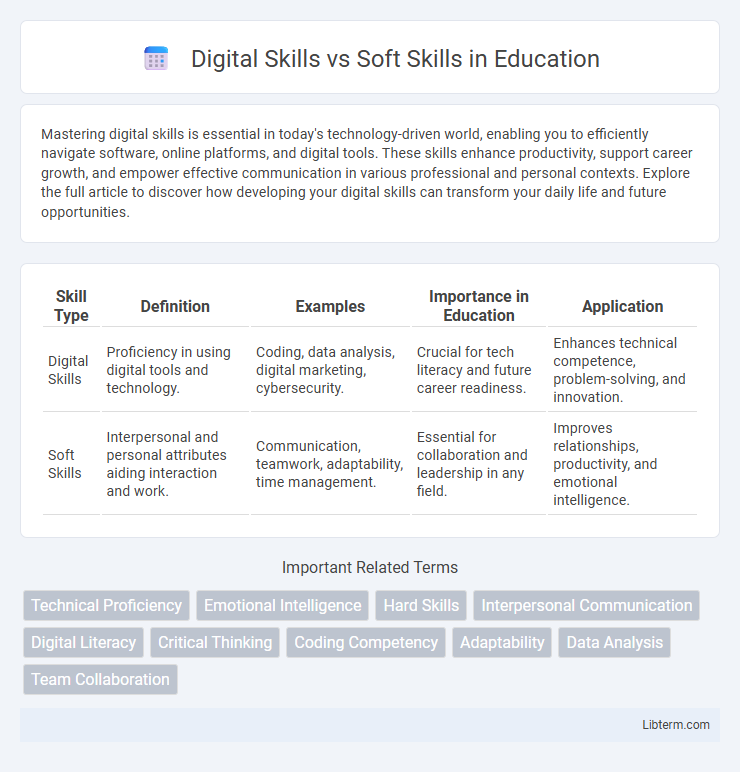Mastering digital skills is essential in today's technology-driven world, enabling you to efficiently navigate software, online platforms, and digital tools. These skills enhance productivity, support career growth, and empower effective communication in various professional and personal contexts. Explore the full article to discover how developing your digital skills can transform your daily life and future opportunities.
Table of Comparison
| Skill Type | Definition | Examples | Importance in Education | Application |
|---|---|---|---|---|
| Digital Skills | Proficiency in using digital tools and technology. | Coding, data analysis, digital marketing, cybersecurity. | Crucial for tech literacy and future career readiness. | Enhances technical competence, problem-solving, and innovation. |
| Soft Skills | Interpersonal and personal attributes aiding interaction and work. | Communication, teamwork, adaptability, time management. | Essential for collaboration and leadership in any field. | Improves relationships, productivity, and emotional intelligence. |
Understanding Digital Skills: Definition and Importance
Digital skills encompass the ability to use technology tools and platforms efficiently, including software proficiency, coding, data analysis, and digital communication. Mastery of digital skills is critical in today's job market, driving innovation, enhancing productivity, and enabling remote work capabilities. Employers prioritize these skills for roles in IT, marketing, finance, and many other sectors, highlighting their role in career advancement and economic growth.
What Are Soft Skills? Key Traits and Relevance
Soft skills encompass interpersonal abilities such as communication, teamwork, adaptability, and problem-solving that enhance personal and professional interactions. Key traits include emotional intelligence, critical thinking, empathy, and time management, which are essential for effective collaboration and leadership. These skills remain highly relevant across industries as employers prioritize candidates who can navigate complex social dynamics and contribute to a positive work environment.
Digital Skills in the Modern Workplace
Digital skills constitute essential competencies such as data analysis, coding, cybersecurity, and proficiency with software tools like Microsoft Office and cloud platforms, which drive efficiency and innovation in the modern workplace. Mastery of digital tools enables employees to navigate complex technological environments, improve communication through digital channels, and support data-driven decision-making. Employers increasingly prioritize digital literacy due to its direct impact on productivity, agility, and the ability to adapt to rapidly evolving industry demands.
The Role of Soft Skills in Career Success
Soft skills such as communication, adaptability, and emotional intelligence play a crucial role in career success by enhancing teamwork and leadership capabilities. While digital skills enable technical proficiency, soft skills foster effective collaboration and problem-solving in dynamic work environments. Employers prioritize candidates with strong interpersonal skills as they contribute to a positive workplace culture and drive organizational growth.
Comparing Digital and Soft Skills: Key Differences
Digital skills encompass technical abilities such as coding, data analysis, and digital marketing, essential for navigating modern technology-driven environments. Soft skills involve interpersonal traits like communication, teamwork, and problem-solving, critical for effective collaboration and leadership. The key difference lies in digital skills being task-oriented and measurable, while soft skills are behavior-based and influence workplace dynamics.
How Digital and Soft Skills Complement Each Other
Digital skills enable efficient use of technology, while soft skills such as communication and adaptability enhance collaboration and problem-solving in digital environments. Combining technical proficiency with emotional intelligence fosters innovation and drives project success. Employers prioritize professionals who integrate both skill sets to navigate complex, technology-driven workplaces effectively.
Industry Demand: Which Skills Are Companies Seeking?
Companies increasingly prioritize digital skills such as data analysis, programming, and cybersecurity to stay competitive in a technology-driven market. Soft skills like communication, adaptability, and problem-solving remain essential for effective teamwork and leadership across industries. The highest demand arises for candidates who blend strong digital competencies with advanced soft skills, enabling innovation and seamless collaboration.
Strategies for Developing Digital Skills
Mastering digital skills requires a focused strategy combining hands-on practice with continuous learning through online courses, tutorials, and certifications in areas like coding, data analysis, and digital marketing. Leveraging platforms such as Coursera, Udemy, and LinkedIn Learning enhances proficiency in emerging technologies like AI, cloud computing, and cybersecurity. Integrating real-world projects and collaboration tools strengthens practical application and adaptability in fast-evolving digital environments.
Enhancing Soft Skills in a Digital World
Enhancing soft skills such as communication, emotional intelligence, and adaptability is crucial in a digital world dominated by technology and automation. Employers increasingly prioritize collaboration, critical thinking, and leadership abilities alongside technical digital skills to drive innovation and maintain workplace harmony. Developing these interpersonal competencies enables professionals to effectively navigate digital tools and remote working environments, fostering stronger team dynamics and improved productivity.
Future Trends: Balancing Digital Skills and Soft Skills
Future workforce success depends on balancing advanced digital skills like AI proficiency, data analysis, and cybersecurity with essential soft skills such as adaptability, emotional intelligence, and communication. Emerging trends emphasize the integration of digital literacy with creativity and critical thinking to navigate complex, technology-driven environments. Employers prioritize this hybrid skill set to foster innovation, collaboration, and resilience in rapidly evolving industries.
Digital Skills Infographic

 libterm.com
libterm.com